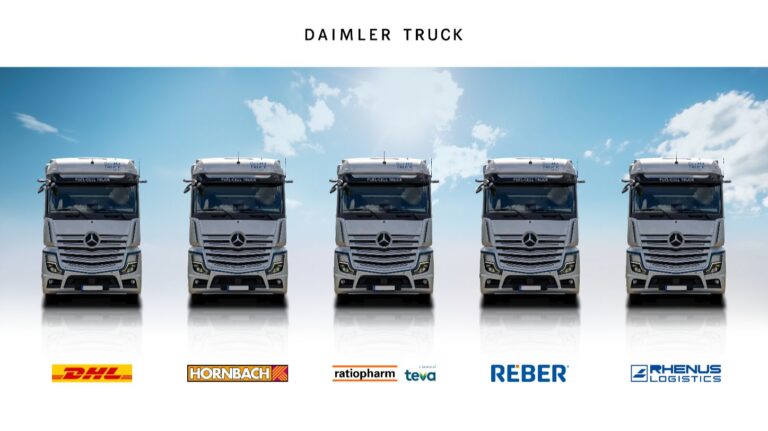Daimler Trucks has announced that it has started the planned second phase with five additional partner companies (after the initial customer trials of its Mercedes-Benz GenH2 Trucks), to prepare its fuel-cell trucks for series production based on real-world customer requirements.
Hornbach, Reber Logistik, Teva Germany (with its brand ratiopharm), Rhenus, and DHL Supply Chain will each successively deploy a Mercedes-Benz GenH2 Truck on their regular logistics routes within Germany.
The goal is not only to test use cases across various industries and capture additional operating scenarios, but also to ensure that all findings feed directly into further vehicle development as well as preparations for sales and service processes.
All five fuel-cell trucks will be deployed by the partners over a period of one year on different routes under real operating conditions in various logistics applications.
This includes temperature-controlled pharmaceutical transport to general cargo transport in international long-distance transport.
As a fuel-cell truck with a gross vehicle weight of around 40 tons and a payload of approximately 25 tons, the Mercedes-Benz GenH2 Truck offers technical specifications on par with modern diesel long-haul trucks.
Its fuel-cell system delivers a continuous output of up to 300 kW, supported by a small buffer battery to provide situational power support during peak loads and to recover energy during braking.
The truck uses liquid hydrogen as the energy source, which offers significant advantages over gaseous hydrogen: higher energy density enables greater range per tank fill and reduced transport requirements – both enhancing economic efficiency and sustainability of operations.
Refueling takes place at dedicated liquid hydrogen (sLH2) stations in Woerth am Rhein and the Duisburg area.
In the initial trial phase, the five fuel-cell trucks covered more than 225,000 kilometers in total, with average hydrogen consumption ranging between 5.6kg and 8kg per 100km, depending on use case, and an average combined vehicle weight between 16 and 34 tons.
DHL Supply Chain Germany & Alps CEO, Katrin Hölter, said: “With the fuel-cell truck in combination with our fully electric refrigerated trailer, we’re bringing a zero-carbon transport solution to the road that is fully powered by renewable energy.
“Its deployment in operations on routes across Baden-Württemberg, Hesse, and North Rhine-Westphalia proves that forward-looking, sustainable logistics already works today — even for sensitive frozen and fresh products.
“Together with Daimler Truck, we are setting new benchmarks for zero-carbon transport and reinforcing our commitment to being the Green Logistics of choice.”
Achievements and innovations in alternative fuels will be recognised and celebrated at the fourth annual CiTTi Awards on 25 November 2025 at De Vere Grand Connaught Rooms in London. Visit www.cittiawards.co.uk to learn more about this unmissable event for the UK’s transportation sector!






